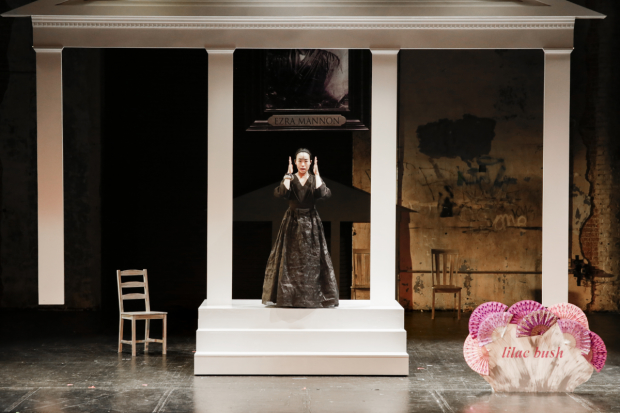Mourning Becomes Electra

(© Gaia Squarci)
Eugene O'Neill's gargantuan masterpiece Mourning Becomes Electra, with its epic length (essentially three full-length plays rolled into one) and its lofty aspirations to Greek tragedy, is an enormous undertaking for any theater company. Target Margin Theater, whose production of the work is currently running at Abrons Arts Center, is to be commended for its ambitious attempt to revive O'Neill's rarely performed play. Innovative staging and strong performances bolster this experimental production, but several awkward directorial choices muddle the execution and make this pared-down version of the work a wobbly, lugubrious affair.
The plot of Mourning parallels events found in Aeschylus' Oresteia trilogy, which tells of king Agamemnon's murder at the hands of his wife and her lover, and the subsequent revenge taken by Agamemnon's son, Orestes, and daughter, Electra. O'Neill places the action of his work at the end of the American Civil War in the Mannon mansion (Lenore Doxsee's simple set design effectively recalls a Greek temple). The townsfolk, a Greek chorus of sorts led by groundskeeper Seth (energetically performed by Mary Neufeld), give us background on the wealthy and aloof Mannons.
Lavinia (the "Electra" of the title, played with elegant severity by Eunice Wong) awaits the return of her father, Ezra (Satya Bhabha in one of three roles). She has discovered that her mother, Christine (a poised Stephanie Weeks, wearing a green, anachronistically sequined dress), has had an affair with one of Lavinia's suitors, Adam Brant (Bhabha). Together, Christine and Adam decide to kill Ezra. Family secrets are revealed when Lavinia's brother, Orin (Bhabha again in his strongest performance), comes home, and the two conspire to exact revenge for their father's death by killing Adam. Lies, treachery, and murder ensue, leaving Orin tormented by guilt and unable to bear the thought of living in a house filled with ghosts of the Mannon dead. Lavinia, whose life has always been filled with mourning, is more willing than her brother to embrace the fate of being a soul damned to live out her days in the Mannon house alone.
Not the cheeriest stuff, to be sure, but O'Neill's play is dense with grand themes of love and death and the ugly legacies that families pass from one generation to the next. Freudian neuroses (Orin's and Lavinia's respective Oedipus and Electra complexes in particular) also permeate Mourning, and director David Herskovits shows us evidence of these now and then. But exploring O'Neill's themes and preoccupations takes a back seat to the production's experimental aspirations.
Some of these experiments can be exciting, as when the audience is moved to different locations in the theater after each intermission (there are two, at which the audience is served light fare). For the third and last play in the cycle (the most satisfying part of this production), audience members are actually seated on the stage, symbolically entering the Mannon house. Other experiments are haunting, as when the actors' voices are suddenly pumped through nearby speakers to give an otherworldly sound to secret words exchanged between characters (creative sound effects by Herskovits, Jesse Freedman, and Matthew Good).
But Herskovits undermines these provocative innovations whenever a passage has been excised from O'Neill's text (much has been cut to get the run time down to five hours, including the two intermissions). In these instances, piped-in musical interludes suddenly rise and drown out the actors' voices — indicating an omission from the text and, presumably, the passage of time — as the audience watches actors silently mouth their words. This directorial choice diminishes the play's action and forces the audience to wait, often impatiently, for the dialogue to audibly resume. It is not uncommon for Mourning to be cut in performance, so interpolating musical passages to serve as ellipses feels unnecessary.
Other stagy theatrics pepper some serious scenes with unintended comedy and make us wonder whether we're witnessing a parody of O'Neill's work. Herskovits has his actors frequently, though not consistently, deliver their lines with exaggerated, sometimes melodramatic inflections and with mannered Kabuki-style gestures. At times, this almost suits O'Neill's melodrama-tinged plot, but the actors, already doing plenty of heavy lifting, often appear to be buckling under the weight of Herskovits' vision.
Wong is an exception. She looks every bit Lavinia with her angular yet graceful movements and her austere black dress (costumes by Kaye Voyce). She deserves to be lauded for shouldering her enormous part through all three sections of this chef d'oeuvre and for delivering an exceptionally strong performance from the first scene to the last. O'Neill's Electra becomes her.











